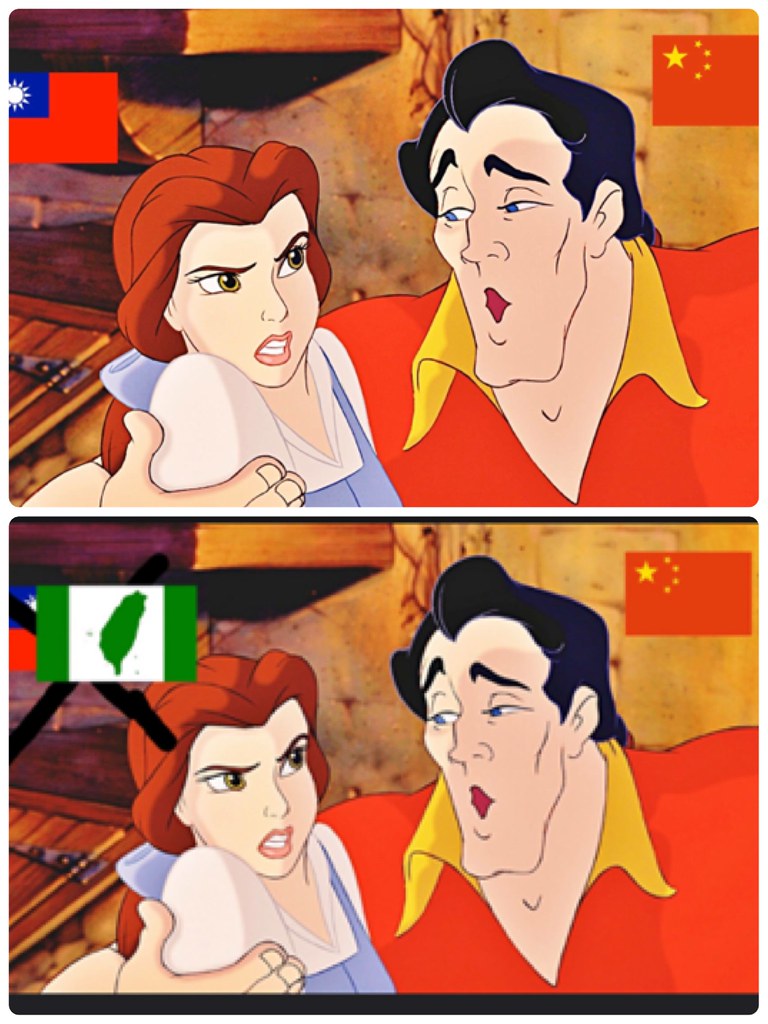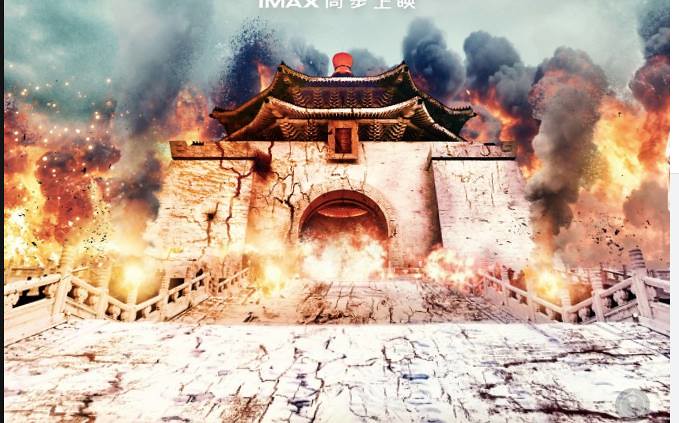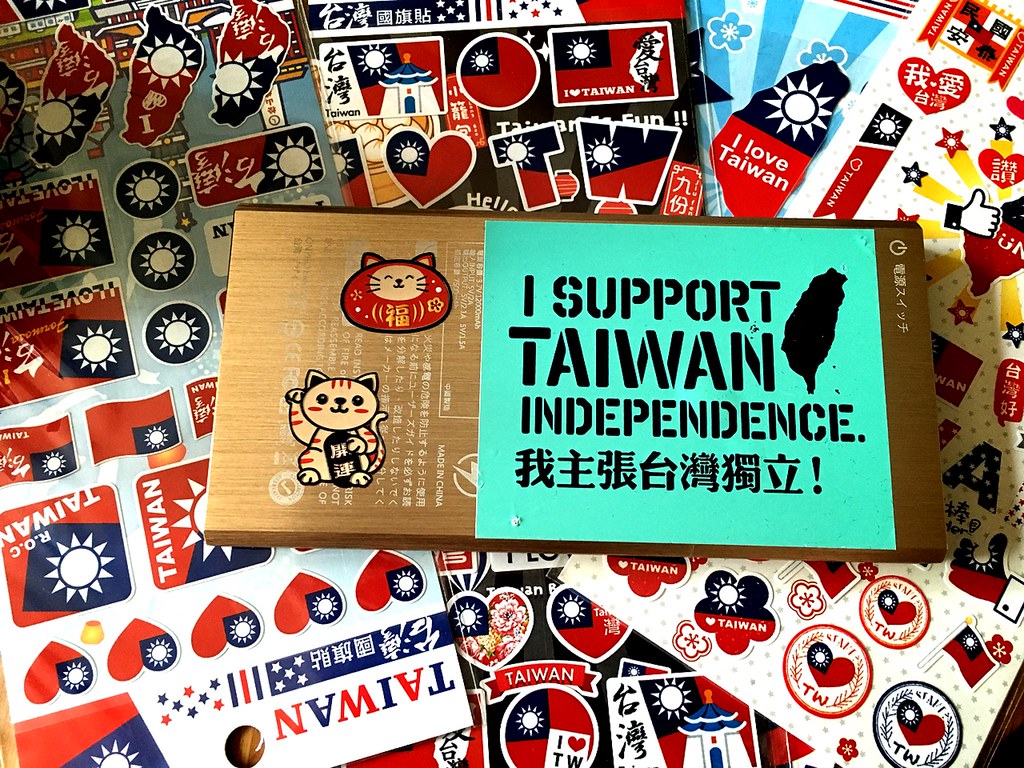The other day, I walked to the nearby general store to replace my dying external battery. I didn't know external batteries could just stop working like that - turns out, much like American democracy, they can. Many of the choices were already decorated, but I noticed the only ones with Taiwan-themed covers were slathered in the Republic of China flag. This of course means they all prominently featured the KMT 'white sun on a blue field'. Many also had "I love Taiwan!" or "Taiwan" printed on them.
There was no option to buy a Taiwan-themed battery that had any other design on it. It was the ROC flag or nothing. I bought a plain battery.
As I thought more about this, it didn't bug me that as a consumer, I couldn't get a pro-Taiwan design that I liked, or made sense to me, or was even pro-Taiwan to begin with (there is nothing pro-Taiwan about the KMT's history, and nothing pro-Taiwan about allowing one party's symbol to dominate the national flag of a country whose official name doesn't even contain the word 'Taiwan'.) It bugged me that the ROC flag, in many instances, is still the default symbol of Taiwanese identity.
When we complain that Taiwan can't even show its national flag at certain events, we are not complaining about the "Taiwanese" flag. That doesn't officially exist, although concepts abound. We are complaining about not being able to wave the Republic of China flag, which I have already written about. When a pop star is abused by Chinese trolls for waving her country's flag, they're not mad about a Taiwanese flag, they're mad about a Chinese flag that they don't like.
The problem here is that when waving the ROC flag is the default show of support, it pushes the idea of waving any other, more pro-Taiwan flag (really any one of the designs will do) into the realm of what some would call "extremism". When it's "sensitive", causes a kerfuffle or is an open act of protest to wave that sun - although still within the bounds of moderate discourse - you suddenly become a crazy extremist nutbag for saying "hey that flag actually sucks", and are left to choose from an array of not-quite-national-symbol designs, which further cement your status as a nutbag. In this worldview, nutbags reject officially approved symbols of "protest" - the ROC flag - and design their own (more extreme) symbols instead.
When the international media writes about people like Chou Tzuyu getting in trouble for waving the ROC flag, imagine what they'd write if she'd been abused for waving a flag that was actually Taiwanese.
This annoys me to the point that I can't even make a good meme about it without feeling all sorts of angst over my choices. Do I go with what's clear to international audiences, or do I get rid of that damn glaring sun the way I want to?
 |
| HOW TO EVEN MEME?? |
Further to that, when international discourse mainly recognizes two narratives - the CCP one and the KMT one, as evidenced by the dueling flags - to say both of them are riddled with problems becomes an 'extreme' position. Perhaps not in Taiwan so much anymore, but certainly on an international scale. At Exeter last year, I felt that arguing a pro-Taiwan position as 'not a part of China' was taking something of a controversial stance, without even getting into the ROC compared to Taiwan. Going further and arguing that not only was Taiwan not a part of China, it was not in fact Chinese (that is, that not even the ROC was legitimate) felt like arguing an extreme view.
Like, oh, you support the ROC? Hold up there bucko, that's a sensitive issue! Okay, but just remember, it's a sensitive and complex situation...
...wait, what? You support the Republic of Taiwan? You don't even think Taiwan is fundamentally Chinese? You don't even want to wave the ROC flag - that's not enough for you? That doesn't fit in with the framework I've adopted, which was written for me by the CCP, the KMT and media reporting on the issue! Therefore it must be extreme!
This is especially troubling, as being pro-ROC at least in the US is (usually) a conservative stance. Being sympathetic to China is generally a liberal one. Moving beyond the ROC to support Taiwan, then, must be an extreme conservative view - even though in Taiwan it is very much a view espoused by most (though not all) of the left. Not even the extreme left. These days, just the normal, albeit young, left.
Nevermind of course that these days being pro-ROC is at least being nominally pro-democracy if you don't really understand the history of the ROC, and being sympathetic to China is being pro-dictatorship, when in the West the right-wingers are the ones who have a more authoritarian bent. The left assuages its guilt for being sympathetic to a brutal dictatorship by reassuring itself that "well they do things differently in other countries and we have to respect that, so we can't hold it against them or criticize them for not giving their people the basic human rights we demand for ourselves. Democracy is great for us but they don't need or want it because they're...Asian or something."
This bothers me because arguing a pro-Taiwan stance is not an extreme position. It's actually quite moderate. It's reasonable.
It's the position that reflects a desire to recognize what is already true.
It is a stance that recognizes the full breadth of Taiwanese history, simply from having read it. It is the stance that respects the will of 23.5 million people who are already self-governing in a liberal democratic system. It is the stance that understands the nature of the ROC's coming to Taiwan, their past crimes here, and how the label of being "Chinese" has been externally imposed rather than organically grown. It is the stance that understands how little support the last, wheezing scions of the old ROC order have as they face the short march to their inevitable sunset. It is the stance that is pro-democracy and understands that the ROC is a formerly authoritarian government which is only now democratic because the people of Taiwan insisted on it. It is the stance of someone who actually believes in liberal democratic values and is willing to apply that to global situations. It is the stance of understanding that doing so is not cultural imperialism when the people you are applying it to agree with you.
In a post-Sunflower world, it is the stance that reflects reality.
I don't even think it's terribly extreme to say that Dead Dictator Memorial Hall should go. Certainly the grounds are pretty and we can preserve them (without the dead dictator), but it's not insane to want to burn the whole thing to the ground. After all, it rhapsodizes the murderous rule of a horrible foreign dictator, turning him into a personality cult icon. Why shouldn't it go? How does this not make sense?
 |
"Masquerading as a man with a reason
My charade is the event of the season
And if I claim to be a wise man,
it surely means that I don't know" |
In fact, I'd say being sympathetic to China is the extreme position, being pro-ROC is only slightly less extreme, and being pro-Taiwan is the normal choice. I can't even begin to assign 'right' or 'left' labels to this, though, because the original framework has been so skewed that it doesn't make sense in this dimension. It doesn't fit in with our laws of nature.
And yet the rest of the world only knows Taiwan's story through the media they consume. The vast majority have never been here and never will. The media reports the CCP and KMT narratives, and when they bother to include pro-Taiwan narratives, marginalize them so much that they're easily dismissed as the ramblings of a group of crazy ethno-nationalists who won't face the reality that Taiwan is fundamentally Chinese, or that it "shouldn't matter". Why "shouldn't it matter"? Because the left especially has grown so anti-nationalist/separatist that any attempt to assert sovereignty, even sovereignty a group already has, is seen as "extreme". The media isn't reflecting reality, it is helping to create reality. What scares me is I'm not even sure they realize it.
I'll leave you with this: when I was at Exeter, if the topic came up, I would argue a pro-Taiwan stance. I do not suffer the foolishness of the ROC. People listened, certainly they were too thoughtful to dismiss it out of hand. And yet more than once, a comment slipped out among my professors and cohort that made it clear that they still saw Taiwan as fundamentally Chinese (e.g. "Taiwan and the rest of China", or "we have a few Chinese students" when in fact we had only one, from Macau. The other identifies as Taiwanese.)
If that was their default, what did they make of my pro-Taiwan views?
Do they take for 'extreme' what I see as - what I know to be - merely normal?
In other words, get out of here, wayward sun.
There will be peace when you are done.


Jenna, sincere thanks for your post. Just to add some 0.02$ here:
ReplyDeleteRegarding the media portrayal of TW and its relationship with CN, I feel that the problem is deeper than the chronic misunderstanding on the *international* level. Really, how many *national* Taiwanese media reject the wording such as "大陸" and put Chinese news in the "international" section, except of course 民視 and 自由時報? You can of course argue that this is mostly the problem of the traditional media, but I'm yet to meet a Taiwanese who doesn't watch TV everyday. Yes, the general TW public identifies themselves as Taiwanese, but how many of the same general public do *not* identify themselves with the ROC flag? How many of them went to the memorial museum of 鄭南榕 at least once, while the ubiquitous Holy Places of the lovely couple SYS&CKS are still visited by thousands on a daily basis?
The issue is really complex. I think you even mentioned it in your Review of Wandering in the Garden. Yes, it is indeed a liberal and a moderate and an absolutely reasonable stance to be pro-Taiwan, but at present, even many Taiwanese dread of this idea. I have meet wonderful and bright and young and educated people, who confuse "pro-Taiwan" with "anti-China" in pretty much the same way as the ol' good int'l media does - not to speak of the older, less educated, and less bright CKS/CCK generation. For them, being "pro-Taiwan" might as well mean waving an ROC flag, or signing the national anthem - I hope I don't need to remind you the lyrics.
It will take years even for many (if not most) Taiwanese to change their attitude to their own politics, the foreign media will of course just lag behind.
This is my own point of view, perhaps quite a pessimistic one. Would be really glad if you can prove me wrong or show me a brighter side. Thanks again.
Well, in “I have massive flag angst” I talked about how my opinion on the ROC flag might not be the majority one, but that doesn’t change that I hate the flag, and also that it doesn’t make my position an extreme one.
ReplyDeleteI know a few Taiwanese who don’t watch TV but they’re in the minority (and where one puts news from China, in the TW media, is all about political goals. It doesn’t reflect social reality).
I hang with liberal/lefties, but not really the far left. None of them identify with the ROC and I even know many moderates who don’t either.
For everyone else, my opinion may differ but it is by no means extreme, as I’m sure you know :)